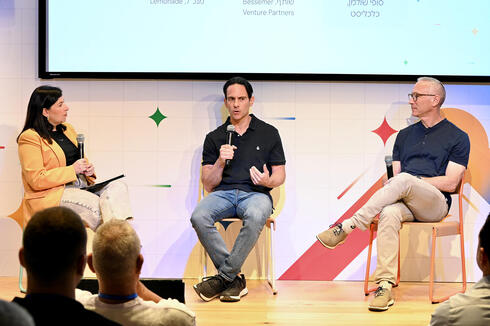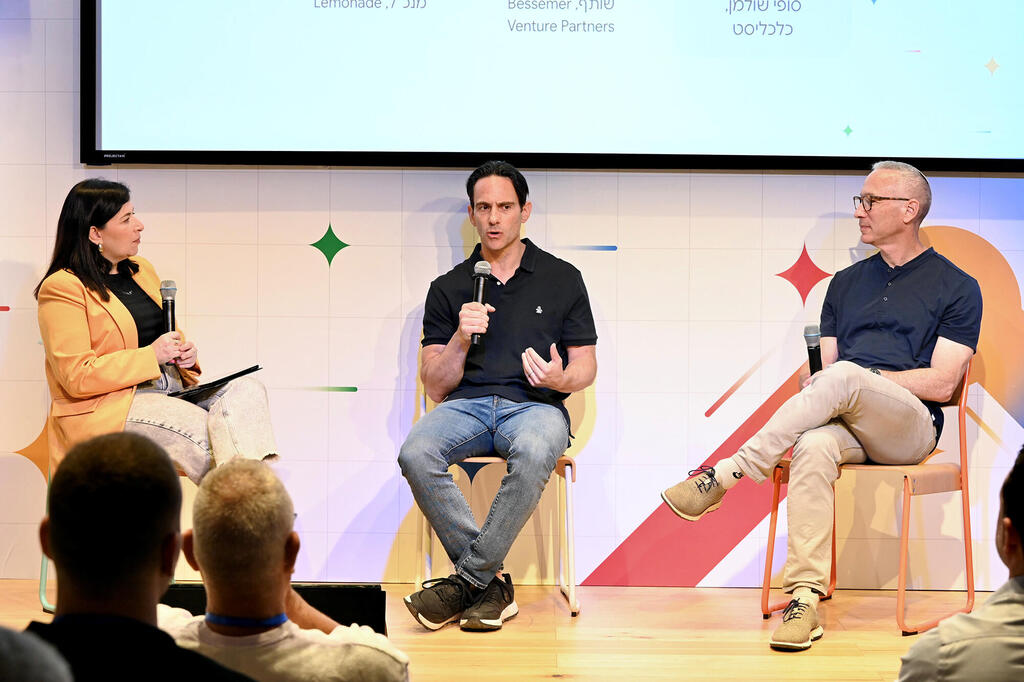
"Companies that figure out how to adopt AI effectively are the ones that will win"
Adam Fisher, a partner at Bessemer Venture Partners, was speaking on a panel as part of Google and Calcalist's Startup Week. Daniel Schreiber, co-founder and CEO of Lemonade: "The pace of change in the AI world is unlike anything we’ve seen before."
Adam Fisher, partner at the venture capital fund Bessemer Venture Partners, and Daniel Schreiber, co-founder and CEO of Lemonade, said at Google and Calcalist’s Startup Week that they agree this is a time when everything is moving fast—and that this pace fits the Israeli community perfectly.
Last year, $100 billion was invested in AI companies—a third of all venture capital investments. Where is it going? How do you know who is really doing AI and who is just BS?
Schreiber: "Lemonade was one of the first companies to use AI, and now everyone is joining the party. We are entering a period of uncertainty. Globally, we’re in great shape—we’ve built infrastructure on the foundations of artificial intelligence. It’s like at airports: there’s a moving walkway that goes slowly, but once you get on, you accelerate. Companies like ours, built from day one on this platform, are now moving at speeds that redefine competitive advantage. Everyone will eventually reach a place that’s hard to imagine. I estimate that today, a startup with $1 million can hire the equivalent of ten developers. Within a decade, it will be like having the development force of tens of thousands—and eventually, every startup will have the power of Google’s engineering team. But the real question is whether the entire organization is built to harness that power and ride this rocket."
1 View gallery


Adam Fisher (center) and Daniel Schreiber (far right) talk with Calcalist's Sophie Shulman.
(Photo: Kobi Kuenkas)
Is it possible to build a cutting-edge company today with just one person—or fewer people? Are checks getting smaller, or is there a need to invest more?
Fisher: "It’s like the early days of cloud and mobile. People said back then that you didn’t need a big revolution—you could just build. As long as there’s competition, resources will find their way to the right companies. We’re seeing a lot of capital flowing into AI startups that want to make acquisitions. The space today reminds me of the early days of the cloud or even the dot-com era. Only a few companies are actually inventing something original in AI, and Israel has a strong advantage here. We’re using AI at the firm level ourselves, not just investing in it. Every company in our portfolio is working with AI. The pace at which Israeli startups are adopting it is impressive—even though we didn’t invent it."
How do you differentiate between deep technologies and more marginal ones?
Fisher: "The companies that figure out how to adopt AI effectively are the ones that will win. People used to say Israelis don’t know how to build serious businesses or products—but that’s exactly what we’re doing now, and with great success in AI."
Many companies are being asked—how do you make money from AI?
Schreiber: "Over the last ten quarters, we’ve grown by two-thirds, while keeping the team lean. The ability to scale the business while reducing headcount is a clear sign that something fundamental is changing. The pace of change in the AI world is unlike anything we’ve seen before. Two to three years from now, all the frontier models will look totally different—and what’s especially interesting is how good they’ve become at programming. Anthropic said that 80% of code written on their platform comes from Claude. AI is now evolving faster than it was just recently. Those at the front can do exponentially more than those lagging behind. I believe we currently have a one-year advantage over companies that haven’t yet adopted AI. In 2007, Netflix launched a failed streaming service. The CEO of Blockbuster wasn’t impressed, but Reed Hastings saw that bandwidth would soon become infinite. AI is following a similar curve—costs are dropping rapidly, and the intelligence of systems is accelerating fast."
What do we do with the legacy part of the portfolio?
Fisher: "They can benefit from AI by streamlining various aspects of the business. We’re not seeing companies shut down—we’re seeing them cut costs and still grow. I’ve invested a lot in product companies because when a product is successful, it’s hard to replace. That’s still true today in AI—how do you build a product that becomes indispensable? That’s the central challenge. We don’t yet have a truly irreplaceable AI product, but I’m proud of the companies that have seized the opportunity to improve their offerings."
You’ve invested in all the big names. Why invest in small Israeli companies in this space?
Fisher: "There aren’t many companies like Anthropic or OpenAI. They’re like fighter jets—extraordinarily powerful but incredibly hard to build, especially in a small country. That said, I trust our community. Our fund is very bullish on Israel. We haven’t slowed down our investments here, and I’ve never seen so many new and experienced entrepreneurs launching companies—even when they don’t have to. It’s a uniquely Israeli phenomenon: serial founders coming back again and again."
What’s your advice to new entrepreneurs?
Schreiber: "Be realistic—Nvidia isn’t going to be founded in Israel, and we probably won’t develop the next frontier language model either. But we can absolutely commercialize those innovations. We study all the top models and adapt them to our needs. Israel is strong in the application layer. My job is to empower the end user. There’s never been a better time for an entrepreneur to build something powerful with very little capital—something ten times more capable than they could have imagined, across a vast range of industries. And it’s only getting stronger."













